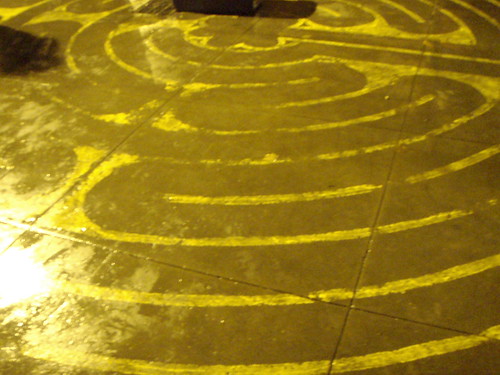Individuals going through a vista or environment looking this way and that, might be considered "immersed" in that environment. A new kind of camera, such as those used to develop Google Street Views, takes in almost a full bubble of vista.
A corresponding projector might fill a 5/8 dome with simultaneous data. Viewers need to turn their own heads to take in aspects of the recorded scene. These vistas may likewise be simulated, generated from models, where the vista has no real existence.
Science fiction is less literally a projected rendition than a movie-maker's storyboard. A science fiction novel may provide no pictures at all, as the technology of reading is such that the reader's imagination serves as the immersive environment. One learns to project in the "mind's eye".
Pundits disagree on whether a culture of TV and movies has weakened the mind's eye. Seeing lots of movies gives one more raw material to draw upon, especially when it comes to vividly presented fantasy worlds, so the argument could be made that visualization powers are increasing.
Some point to rising global IQ in the spatial geometry sector, claiming the IQ tests have to renormalize by as much as 7% from one generation to the next, given humans seem to be getting smarter in some ways (yet the average is supposed to stay fixed at 100 regardless).
Others suggest that visualization skills may be improving, but the ability to simply read with comprehension is in decline as attention spans have shortened and more people turn to finished products, canned fantasies, rather than imagining their own worlds. This is also leading to more uniformity in thinking, as people internalize increasingly similar vistas from widely distributed films and DVDs.
The ecovillages in my science fiction are informed by Bucky Works, both a book and (I'd suggest) a genre. In this possible future, the aerospace know-how currently used to militarize and rain terror from the skies, is used to develop these humanly affordable "peaceable kingdoms" complete with horses (where appropriate) and electric ATVs.
But how do such ecosystems survive, if not depending on frequent visits by 18-wheelers loaded with imports? The designer's job requires "bioneering" (ala John Todd and others), such that village inputs and outputs are not unrealistic and therefore unrealizable.
What are the energy sources? Where does the food come from? What health care facilities do we find? What happens when people die of natural causes? Do any trucks at all visit the site? Do we have roads to the village? A rail road? Perhaps there's only an airstrip. What kinds of cargoes do airplanes bring? What medicines? What functions does the ecovillage perform? Rehab for those suffering from PTSD?
Once one gets into the nitty gritty of ecovillage design, there's a lot to consider. The capabilities of the aerospace dwelling machines needs to be factored into the equations, but if these don't yet exist... what might we realistically imagine? How much power do they require? Who has the prototypes? Will companies replace their cube farms with ecovillages? Might we find a call center in the Andes?
The world's militaries and paramilitaries already engage in these kinds of studies on a large scale. War planners often assume roads will be constructed or improved. They also assume helicopter access, with or without surface roads. Locally grown food, such as gardens, may be featured on some bases, however most corporate designers imagine food stuffs coming from outside providers, perhaps from the surrounding community (such as fresh fish in Vietnam). A lot depends on whether one assumes a friendly or hostile surroundings.
Some of my more recent writing looks at medications, their supply and distribution within a camp. Weaning people off medications is sometimes a treatment goal. Other ecovillages might be specifically designed for cancer patients undergoing chemo and radiation. One might design dome-shaped outer shells, transparent to full spectrum sunlight, and then have a mix of facilities inside, including clinics and food stores.
This genre of futurism is already somewhat established in the literature. I'm certainly not the only contributor. Bucky Works is a real book, by J. Baldwin.







